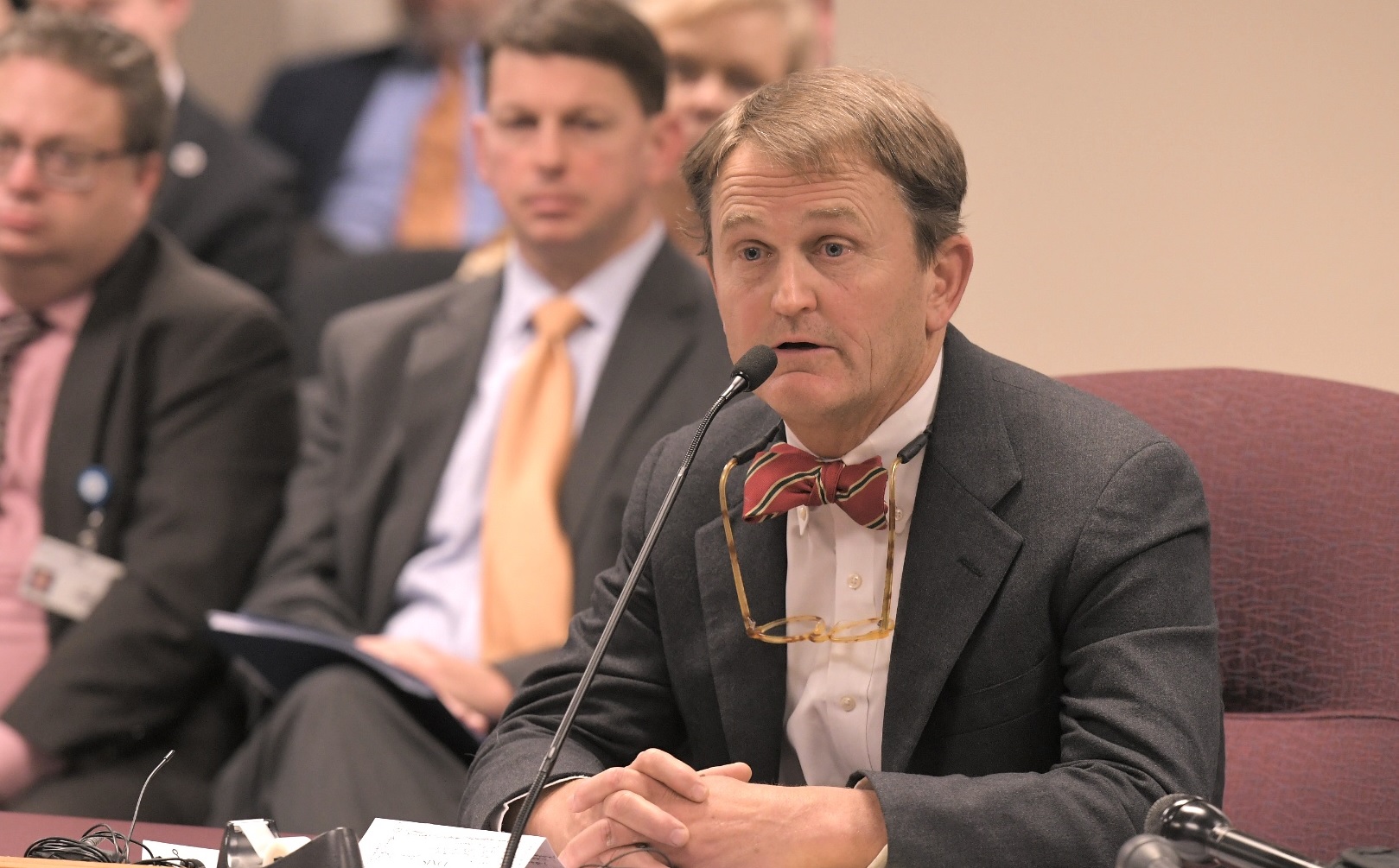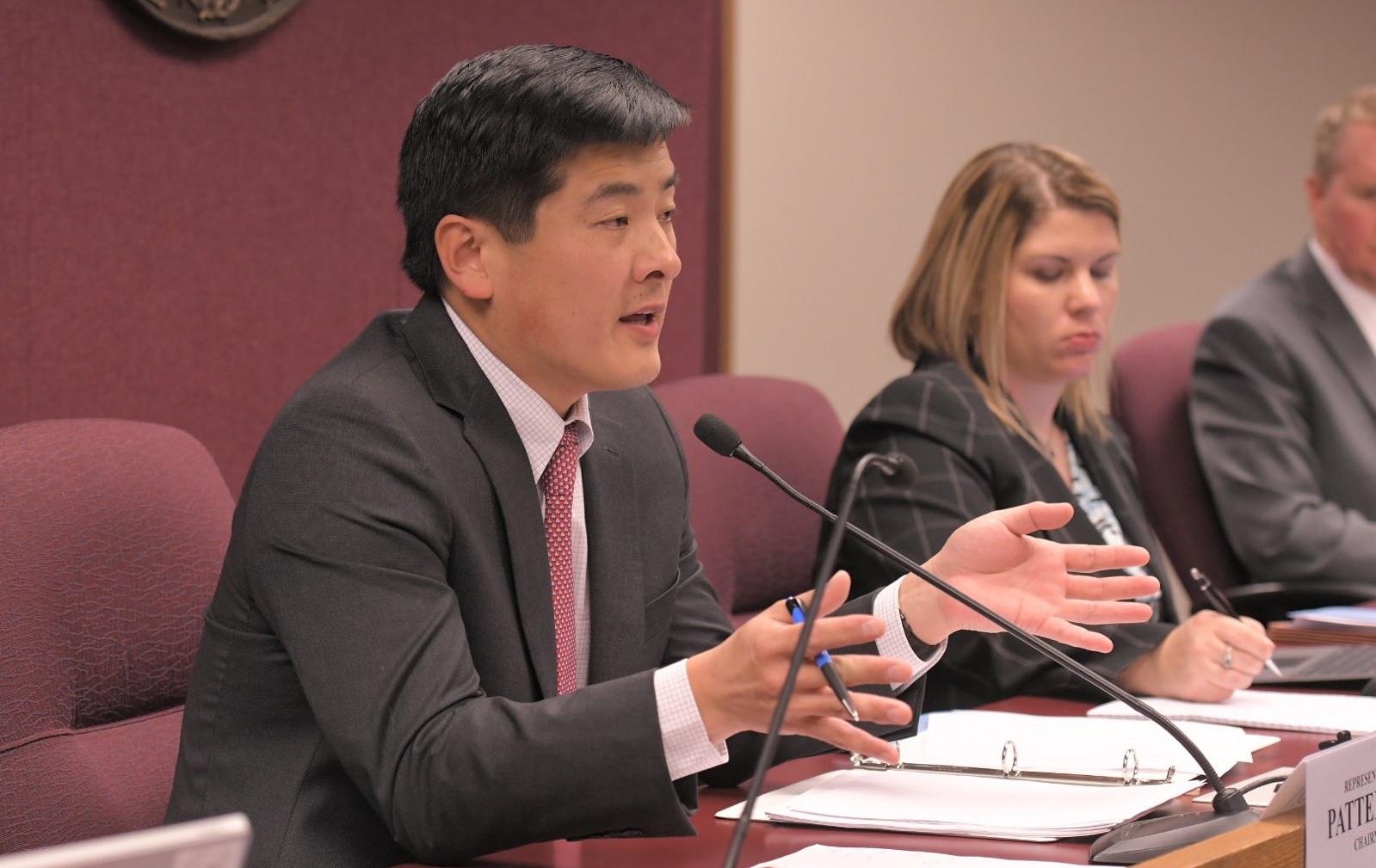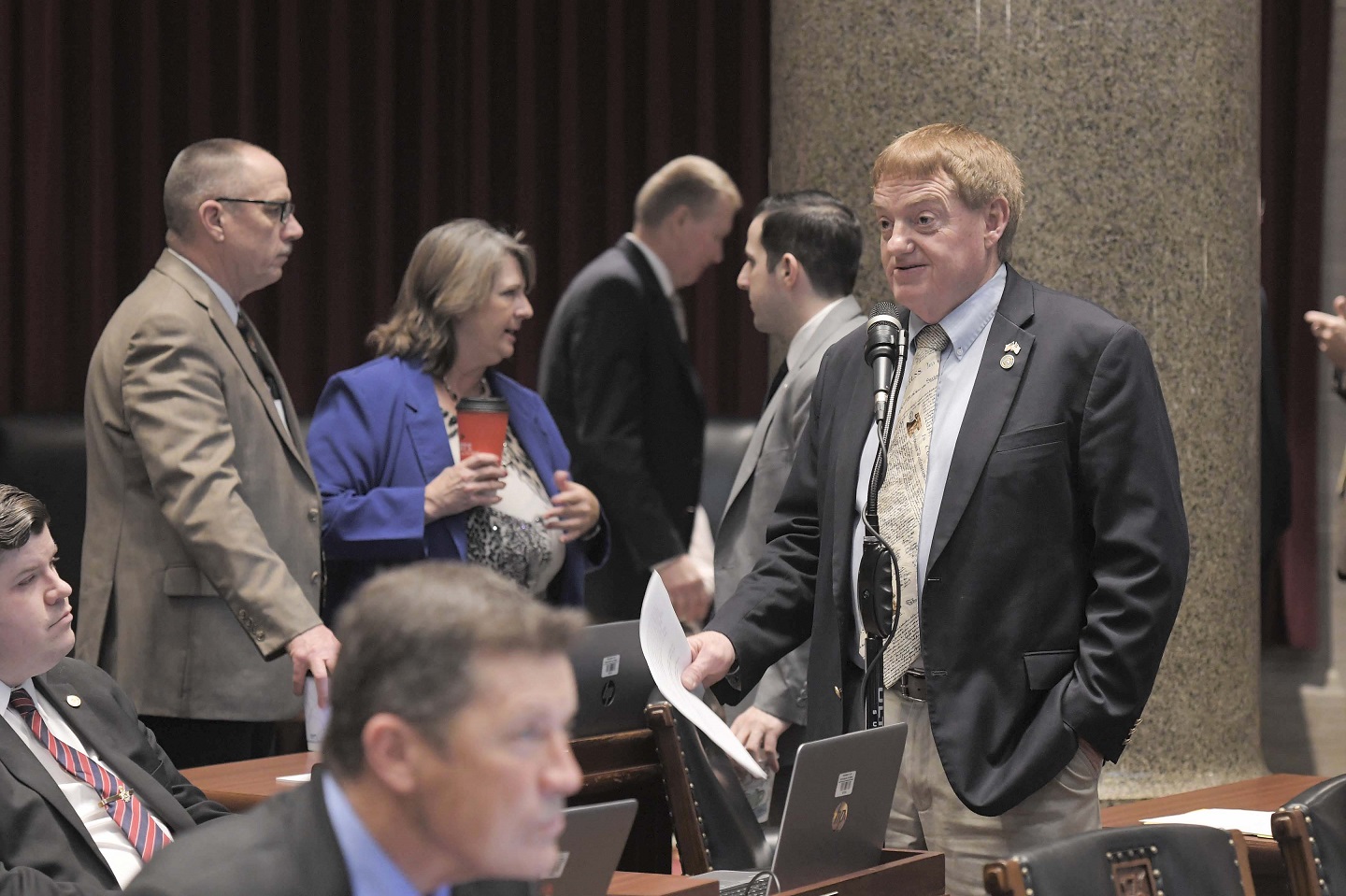VIDEO: House Republicans discuss response to corona virus and more with media
‘Corey’s Law:’ House proposal aims to preserve evidence in Missouri stabbing cases
Missouri House Members are looking for the right way to make sure evidence is not discarded when a person is stabbed or shot.

The bill is known as Corey’s Law for Corey Laykovich, who at the age of 22 died in a hospital after being stabbed in 2013. The investigation of his stabbing was hindered when his clothing was discarded while he was being treated in the hospital, eliminating the possibility that DNA evidence on that clothing might have found his killer.
A man pleaded guilty to the crime five years later and was sentenced to 9 years in prison for voluntary manslaughter. Corey’s mother, Michelle Metje, believes his sentence could have been longer if the evidence had been secured.
House Bill 2086 would require emergency rooms to have a secure storage unit for forensic evidence collected while treating the victim of a gunshot or stab wound. It would require three hours of annual training for ER staff on the collection of evidence, and that ERs have evidence collection kits. It would also require ER staff to report to law enforcement the treatment of any stab wound that is more than an inch deep.
“In the State of Missouri if it’s a gunshot wound it’s reported to the police department immediately. If it is a dog bite it is reported to the police department, however if it’s a stabbing wound there is no indication that they have to report that. As a matter of fact they’re told by their legal department not to report it,” said bill sponsor Rory Rowland (D-Independence).
Rowland said the loss of evidence such as in Corey’s case is “not uncommon.”

The bill was presented to the House Committee on Crime Prevention and Public Safety. Lawmakers on that panel voiced support for the concept of the bill but discussed with Rowland the need to change the language, particularly concerning stab wounds of once inch deep or less.
“I would rather err on the side of caution,” said Representative Justin Hill (R-Lake St. Louis), a former law enforcement officer. “’Cause a one inch stab wound in the neck is deadly. A one inch stab wound in the buttocks is not.”
Rowland agreed the language of the bill could need some changes and said he is open to exploring those.
Since her son’s death, Metje and Corey’s stepfather, Robert Norris, turned her social work background into Corey’s Network, Inc. It provides support, advocacy, and services to homicide victims in the Kansas City metropolitan police precincts that have no such advocates.
Metje told the Committee the legislation is not a continuation of those efforts.
The Committee has not voted on the legislation.
House votes to allow felons to work in places that sell alcohol and lottery tickets
A House Bill that would remove the restriction on felons working in businesses that sell alcohol and lottery tickets was sent Thursday to the Senate. House Bill 1468 would also lift the requirement that employers with liquor licenses notify the state of any employees with felony convictions.

Bill sponsor Cheri Toalson Reisch (R-Hallsville) said the bill will not only make it easier for felons to find jobs, thus reducing recidivism; it will also make more workers available. She said her county, Boone, has the lowest unemployment rate in the state and more potential workers are needed.
“We need more people to fill these entry level positions and have a place to start, and this will also enable them to support themselves and their families,” said Toalson Reisch. “I like to use my local Casey’s General Store as an analogy. You cannot make pizza and donuts in the back because they sell lottery tickets and alcohol in the front.”
The bill passed with broad bipartisan support. Columbia Representative Kip Kendrick (D) said it is common sense legislation.
Ballwin Republican Shamed Dogan said the bill includes a provision that would prevent an individual from selling lottery tickets if convicted of a past crime that involved those.
The legislation cleared the House 148-1. Last year several amendments were added to the proposal and it failed to pass out of the House, but this version of the bill has no amendments.
Its supporters include the Missouri Petroleum Marketers Association, the American Civil Liberties Union, Empower Missouri, and the Missouri Catholic Conference.
VIDEO: House Democrats press availability for the week ending 03-05-2020
Missouri House Democrats answered media questions after the legislature wrapped up its work for the week.
House Democrats discuss legislation to lift pelvic exam requirement before some abortions
Missouri House Democrats discuss legislation aimed at lifting the requirement that a doctor perform a pelvic exam before conducting a medicine-induced abortion.
VIDEO: Porter Wagoner inducted into Hall of Famous Missourians
The latest inductee into the Hall of Famous Missourians is a country music legend from Missouri whose career spanned decades.
Porter Wagoner was born in Howell County in 1927. Wagoner was known for his flashy, rhinestone covered suits; a boisterous personality on stage; for his television show that spanned two decades; and for launching the career of another country legend, Dolly Parton.
Wagoner’s career took off after he sang on a local radio station out of the grocery store where he worked as a meat cutter. From there he was hired by Springfield radio station KWTO and then signed with RCA Records.
His hits included Green, Green Grass of Home; The Carroll County Accident; and Misery Loves Company. He also wrote songs that were hits for other artists and recorded a series of top ten duets with Parton, including Please Don’t Stop Loving Me, which became a number one hit in 1974.
Wagoner joins other famous Missourians including Mark Twain, Dred Scott, and Jack Buck in the Hall.
The Hall is located in the third floor Rotunda in the Capitol, between the House and Senate Chambers.
House panel told Missouri is ready for coronavirus
A Missouri House panel today heard from three doctors, including the Director of the Department of Health and Senior Services, about how ready the state is for the coronavirus.

Legislators heard Missouri is very prepared and that the best thing Missourians can do to prevent the disease from spreading is wash their hands.
“We have been meeting daily since January 27,” DHSS Director Randall Williams told lawmakers. “I believe we are very well prepared. Our motto is, ‘Hope for the best, prepare for the worst,’ and we think we are prepared for both.”
More than 100 people had been confirmed to have the coronavirus in the United States and it is responsible for six deaths in this country as of Monday afternoon. The disease has killed more than 3,000 people globally. House Speaker Elijah Haahr (R-Springfield) created the House Special Committee on Disease Control and Prevention to assess Missouri’s readiness for the disease to appear here.
Doctor Stevan Whitt with the University of Missouri Health System deals with infectious diseases. He told committee chairman Jonathan Patterson (R-Lees Summit) the current rates of infections and deaths suggest a 3.3-percent mortality rate with coronavirus.
“Which means you have about a 97-percent rate of survival even if you get the virus,” said Whitt.
“And that number’s probably even lower given that there’s been underreporting of the cases,” said Patterson.

Williams noted that the mortality rate is twenty times greater than the flu.
“It’s two percent and the flu is one in 1,000, so you’re talking about two out of 100 versus one in 1,000, so that’s concerning,” said Williams.
No cases of coronavirus have been confirmed in Missouri. Williams, who has been in regular contact with federal officials and his counterparts from other states, said samples from fewer than 15 patients in Missouri are being tested for the virus, while California has tested more than 460 people.
Whitt said corona is very much like the common cold or flu in the symptoms that a person presents.
“You get it from coughing, sneezing, runny nose; all the usual things, contact, close contact with somebody who’s had it, inhalation of droplets – especially a large amount of droplets from somebody who you’re very close to, distance wise,” said Whitt. “We know that cases can be everywhere from completely asymptomatic to death. Most of the deaths are associated with lung involvement and inability to appropriately oxygenate, similar to influenza.”
The doctors told lawmakers that the state has a plan in place for dealing with a pandemic and those plans were made available to lawmakers and the media. They also said the best things the public can do to protect against coronavirus and stem its spread are the same things commonly recommended to keep healthy.
“If you’re sick, please stay at home. If you’re sick and need to go see a doctor please check in, tell them about your symptoms. Usually you’ll be given a mask if part of your symptoms are fever, cough, and/or shortness of breath, and please put on the mask,” said Whitt. “If you’re sick and do not need to be in the hospital or see a doctor just stay home, call in sick. I would encourage [legislators] to help us encourage employers to give very lenient practices to people who are sick and want to stay home during this time.”
Whitt said another concern is the “classic hoarding mentality” applying to things like masks. He said for people who are not sick to wear those affords them very little protection.
“They protect mostly the person from disseminating the disease. For instance the regular surgical masks that are the recommended masks for people who are ill, they don’t really filter air. What they do is they trap particles … that’s what happens when you cough into one, that’s what happens when you sneeze into one,” said Whitt. “If, on the other hand, the person who is the source of infection is not wearing the mask but you are, you still breathe around the edges, you still breathe around the gaps in the top around your nose. It’s not very protective for individuals who are not sick. It’s protective of groups of people to put it on the sick person.”
The doctors also recommended that those who haven’t gotten a flu shot go ahead and do so, as cases of the flu continue to rise.
Williams said the state health lab in Jefferson City now has the capability to test for coronavirus and have a result in six hours.
Doctors said another concern if the disease reaches Missouri will be in hospital and clinic staffing if staff members begin getting sick.
Speaker Haahr said the legislature is prepared to act as needed to support the response to coronavirus, including by appropriating funds or giving authority for the spending of federal funds. He said the citizens of Missouri should know their government is prepared to protect them from the virus, and said he has complete faith in Williams to head up the state’s response.
The committee will hold additional hearings on an as-needed basis.
Missouri House leaders discuss corona virus following committee hearing
The Missouri House’s Special Committee on Disease Control and Prevention held its first hearing today discussing Missouri’s level of preparedness for the corona virus. Leadership and committee members fielded questions from the media following that hearing.
Missouri House votes to exempt private and religious schools from minimum wage law
The Missouri House has voted to exempt private and religious schools from the state’s minimum wage law approved by voters in 2018. The bill would extend the exemption that already applies to public institutions, including public schools.

Voters passed a plan that will increase the minimum wage for hourly workers by 85-cents an hour each year until 2023, when it would reach $12 an hour. It is currently set at $9.45 an hour.
“Already private schools and religious schools have received price increases from vendors because of the new law and many could be threatened to even stay in existence. They have put building processes and plans on hold because of the minimum wage,” said bill sponsor Tim Remole (R-Excello). “I have private schools in my district that have a lot of increases in some of their tuitions. They just received letters, many of the parents, that they will receive a 10-percent increase over the next five years because of the minimum wage law.”
Whitewater Republican Barry Hovis said he remembers voting on the minimum wage proposal in 2018 and he thought that it exempted all schools, not just public institutions.
Republicans say the workers the bill would affect, including teachers’ aides, janitors, cafeteria workers, and bus drivers, are often individuals who choose to work in those private schools to support them, and are often retired.
“They love these kids. They could, quite frankly, take their skills and go somewhere else and make a tremendous amount of money beyond what they’re making in the context of the private school. They know that,” said Representative Doug Richey (R-Excelsior Springs).
Democrats said the legislation goes against the wishes of voters and attacks some of the state’s lowest-paid workers.
“Prop B passed in 145 of the 163 House seats, so it passed in many majority party House seats. It outperformed the Republican candidate in 19 House seats. It passed in 78 of the 114 counties, and it passed in the sponsor’s district by 51.5-percent,” said Representative Judy Morgan (D-Kansas City).
St. Louis representative LaDonna Applebaum (D) said she thinks voters understood that Prop B exempted public schools and not private.
The House voted 94-53 to send House Bill 1559 to the Senate.